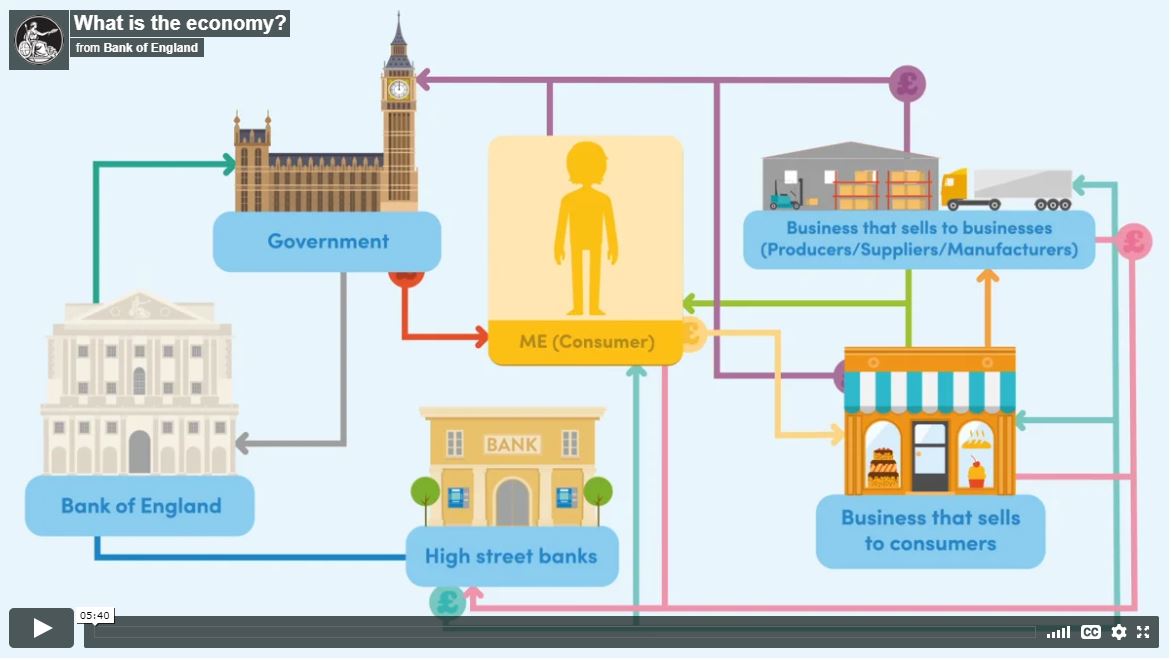What does the word economy mean to you? You’ve probably gathered that it’s to do with money but you might not have realised that it’s also about you. Economic decisions are being made all the time. These decisions affect things like whether you have a job. What you earn and what you do with your money. What’s happening in the economy directly affects your decisions. The economy is like a big network of different parts that work together and influence each other. A decision made by one part can have a knock on effect on the rest. Let’s take a closer look.
Let’s start with you. Most people play a part in the economy by being a consumer. That’s someone who spends money. Consumers make decisions about what they buy and how much they spend. Many consumers also receive money. They might be employed by business and receive wages. They might be self-employed like plumbers or hairdressers who run their own businesses and receive money from people who buy their services. Or they might be retired or unable to work and receive a pension or benefits from the government.
Businesses make money by selling goods or services for more than they pay for them. They decide the prices they charge, who they employ, and how much they pay their employees. If businesses are successful, they grow, and they can afford to employ more people or pay their staff higher wages.
Businesses sometimes have to buy goods or services from other businesses. For example, a fashion shop might buy its clothes from a clothing manufacturer. The manufacturer depends on the fashion shop for its income so it needs the fashion shop to be successful.
High street banks are not that different from any other business. What sets them apart is that they work with money. Looking after it, lending it and helping you pay for things. They let both consumers and businesses save or borrow money. When someone saves with a bank, the bank pays them a little extra money. When someone borrows, the bank charges a little extra money. This extra is called interest. If you borrowed a thousand pounds and the interest rate was 5%, you’d have to pay back the original amount, plus 5% of it. So fifty pounds extra. The interest rates offered by banks can have a powerful influence on your decision to either borrow or save money with them. The economy works in a delicate balance, with money flowing from one part to another. Too much or too little can lead to problems like unaffordable living costs or lots of people being without a job. There are two institutions that make important decisions to control the amount of money flowing around and to keep the economy stable. But who are they?
The government aims to have strong, stable, economic growth helping businesses thrive. It decides how much money or tax to demand from workers and businesses. And then how to spend this money to benefit UK citizens. For example, by running hospitals or schools.
Tanveer, Head of Division: The Bank of England is very different to high street banks. For a start we have over 400,000 gold bars downstairs here in the vaults worth over £100 billion. But our main job, which has been for over 300 years, is to look after the UK economy and the financial system.
Emily, Analyst: A key responsibility of the Bank of England is to ensure that you and I have access to the banknotes we need every day to make payments.
Tanveer: We also make sure that you can make electronic payments 24 hours a day. Another job is to make sure that the high street banks, with which you save and borrow, are safe and sound. The Bank of England also plays an important role in keeping the UK economy strong and stable. The Bank sets bank rate which is a key interest rate in the UK economy. It is used to influence high street banks from which people and businesses borrow or save.
Aakash, Analyst: At the Bank, one of the biggest decisions we have to make on a regular basis is whether Bank rate should be increased or decreased, or whether it should just stay the same.
Andy, Chief Economist: So our decisions at the Bank of England affect you, very much, every day of your life.
When interest rates are higher, saving is more beneficial so people tend to save more. It’s more expensive to borrow money so people tend to borrow and spend less. When interest rates are lower, loans are cheaper so people tend to borrow and spend more. Businesses can thrive. But if there is too much money in the economy, and too much demand for goods, prices tend to rise. Of course the price of some things will go up by more than others and some prices may go down. But when most prices go up, we call it inflation.
One of the jobs of the Bank of England is to keep inflation at 2% per year. If inflation looks set to go above the 2% target, the Bank of England would probably increase interest rates to encourage people to spend less. But if inflation looks likely to fall below the 2% target, the Bank of England would probably cut interest rates to boost spending in the economy. Expert economists at the Bank of England make informed decisions about the level of prices in the economy, and whether prices are rising or falling too quickly. They then adjust bank rate to keep prices stable.
As we’ve seen, along with other influences like family, friends and the media, the economy can play an important part in influencing your decisions. So next time you hear the word economy, pay attention. They’re talking about your life, your decisions, and your future.




